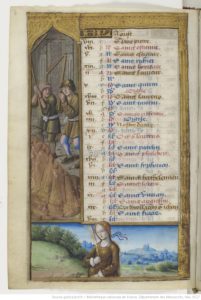On the Kalendar is a series examining some of the lesser known feast days on the Kalendar.

“August”, kalendar page from Les Petites Heures d’Anne de Bretagne (The Little Hours of Queen Anne of Bretagne), by the Maître des Triomphes de Pétrarque. From Bibliothèque nationale de France, Paris (France).
Nothing is known of Hippolytus’s early life. Different sources have suggested a variety of origins for the saint, including Palestine, Egypt, Anatolia, and Rome. As an adult, however, he became quite prominent in the affairs of the church. He was known for his learning and eloquence, and Origen, then a young man, heard him preach in Rome. Hippolytus was very conservative; he was scandalized when Pope Callixtus extended absolution to Christians who had committed grave sins, such as adultery. His conflict with the Holy See continued under Pope Urban I, and Hippolytus seems to have allowed himself to be elected as a rival Bishop of Rome. Eventually Hippolytus and Pope Pontian (whom Hippolytus had also opposed) were both exiled to Sardinia, where they were probably condemned to working in the mines. Apparently, though, both men were reconciled with Rome before their deaths, because both were buried in Rome on August 13th, probably in A.D. 236. Hippolytus’s funeral was conducted by Saint Justin the Confessor.
In all likelihood, Hippolytus died from conditions in the mines of Sardinia. However, other versions of his death are recorded, as a result of the saint being confused with other characters of the same name. One such Hippolytus was a bishop of Portus, who was put to death by drowning in a deep well. The most common version of his death, however, is that he was dragged to death by wild horses. This, of course, is stolen from Greek mythology. The mythical Hippolytus was the son of Theseus, king of Athens, by his second wife, Hippolyta, queen of the Amazons. (Theseus had abandoned his first wife, Ariadne, on the island of Naxos as they were fleeing Crete, where Theseus had slain the minotaur with Ariadne’s help.) Theseus’s third wife, Phaedra (Ariadne’s little sister; they were both daughters of the King), fell in love with Hippolytus, but he spurned her advances. Aside from being squicked out by advances from his stepmother, Hippolytus also seems to have been a devotee of Artemis, goddess of the hunt, who demanded chastity of her followers. And in this devotion, Hippolytus may have spurned the patronage of Aphrodite, goddess of love, who may have caused Phaedra to fall in love with Hippolytus as an act of revenge. In any case, Phaedra, having been rejected by Hippolytus, complained to her husband Theseus that Hippolytus had raped her. Theseus calls upon Poseidon, his patron god, to punish Hippolytus. Poseidon sends a bull from the sea to frighten Hippolytus’s horses as he is riding his chariot along he shore. The horses, frightened, bolt, and drag Hippolytus to his death. It’s possible that some authority figure might have used this form of execution to be clever, given the saint’s name. But at the time of his death, wasn’t at odds with any authority figure. In fact, as noted above, he had apparently reconciled with Rome, and with any authority figure who might have wanted to punish him beyond being condemned to work in the mines.
Because of this association with horses, however, Hippolytus became the patron saint of horses. (The medieval mind worked in wondrous ways.) In the Middle Ages, the church of St Ippolyts (Ippollitts) in Hertfordshire was a destination for people in search of a cure for their sick horses.
Saint Hippolytus’s feast day is August 13th, the day of his burial, as the actual day of his death is uncertain.


